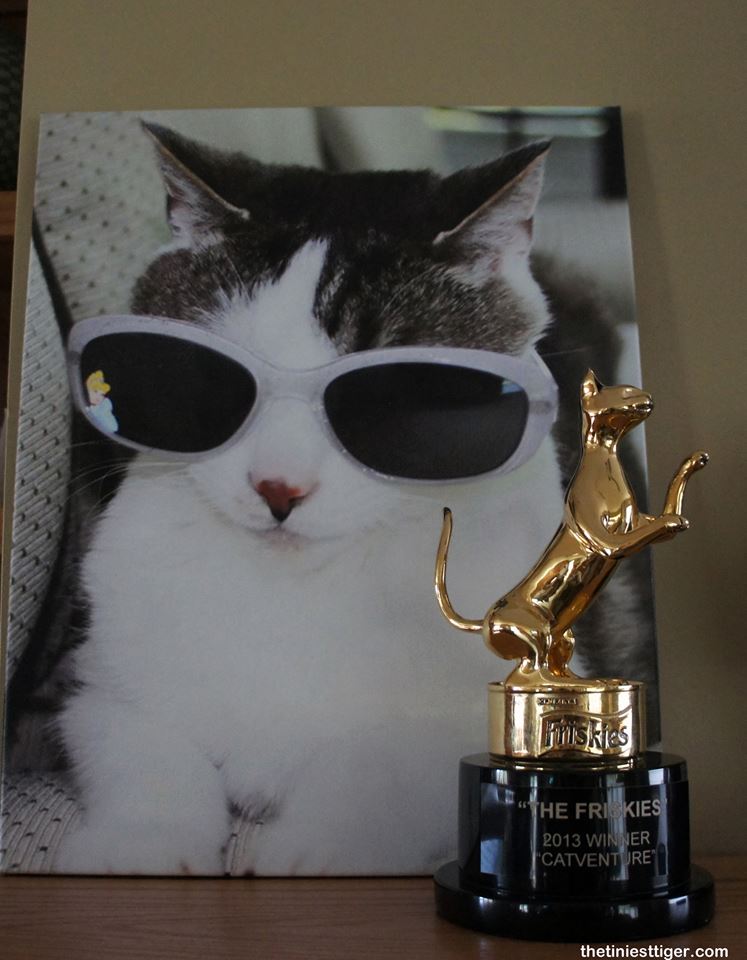What to Expect From a Vet
Every Thursday our resident cat expert and vet, Dr. Richard Goldstein from Mobile Vet Squad does a vet Q & A. We invite readers to submit questions to [email protected]
This week is Take Your Cat to the Vet Week. Valuable info at http://www.petfinder.com/pet-health/take-your-cat-to-the-vet.html
A poll from Cat Channel.com posed this question: What challenges keep your cat from seeing the vet? The results are revealing.
1) Fear of cat carrier- 22.13%
2) Not in my budget- 44.27%
3) Utter loathing of vet/vet’s office- 13.44%
4) Do I need to go? I’m an indoor cat- 20.16%
Editor’s note: I’m not surprised that finances are the biggest reason for not taking a cat to the vet, but it’s clear more education is sorely needed. We addressed tips for getting cats into carriers at last week’s Vet Q & A. Cats are masters of disguising symptoms and the only way to know for certain that they’re healthy is to take them for a check-up. If money is a concern, discuss this with your vet. Most vets take credit cards, many give discounts and can tell you about treatment options. The Humane Society has this video on low cost vet resources http://www.humanesociety.org/animals/resources/tips/trouble_affording_veterinary_care.html low cost options.
This week’s Vet 101 question is:
Our vet takes our cat into an examining room and I wait in the waiting room. Is this normal? I’d like to know what does a routine check-up involve for an 8-year-old male cat and why can’t I help assist in the examining room.
Answer:
Today’s “Word of the Day” is COMMUNICATION.
The relationship between a veterinarian and a patient and their family is one that is based on trust, sound medical practice, and communication. There is no definitive way for a veterinarian to practice the art of medicine, and there is no “normal” or “routine” when it comes to practicing. What is most important is that you and your veterinarian are communicating and are on the same page about how to treat your pet. If you are uncomfortable about not being with your cat during his exam, ask the vet if you can be there. If he says, ‘no’, ask why not. If you’re not satisfied with the explanation, it may be time to find a new vet. But be aware, that even if you are present in the room, you will most likely not be permitted to “assist.” This is for safety, insurance, and legal reasons (not to mention that the cat shouldn’t associate getting a shot with you being the one restraining him for that!)
There are some valid reasons why the vet may have you sit in the waiting room. Some owners may prefer not to be in the room because they get nervous themselves. Since our cats often sense our unease, some cats may actually be calmer for their exam if mom is not in the room. If blood needs to be drawn or tests need to be performed, a quiet, darkened room with as few people as possible may make it less stressful for a nervous kitty. Insurance and safety concerns may also come into play. Again, it’s important to communicate. If you want to be present, make your wishes known, and assess the response.
A “wellness visit” for your cat should include a thorough physical examination (the most important part of the visit), a thorough history of any changes you have noticed in your cat’s routine (even subtle ones), any necessary vaccines, and any recommended blood tests (especially for older cats or cats whose “routine” has changed). Everyone practices differently, and the contents of a “routine” check-up will vary between cats, owners, and veterinarians. A discussion with your vet about what is recommended for your cat (and what you can afford) is essential.
The selection of a veterinarian should be done with the same thoroughness as selecting your own physician, or your child’s pediatrician. Ask trusted friends and family members for recommendations. Ask the doctor questions. You need to find someone who you are comfortable with, who you can trust to head up your cat’s medical team, and who listens to you.





8 Comments
Fuzzy Tales
Our human comes into the room with us for examinations, but when they need to take blood or a urine sample, they take us to the back so the techs can hold us.
But after all the vet trips and money spent trying to save Annie, all for naught, the mom is distrustful of vets in general–she feels it’s important not to assume the vet is all-knowing and all-seeing. They make mistakes, and most in our area deal with dogs more than cats. It’s impossible for any one vet to know everything, hard for them to keep up on new findings, alternative therapies, etc. Doing your own homework, your own research, is crucial. The same applies to humans. Gone are the days, the mom hopes, when the doctor was “god” and his/her word was accepted as gospel.
Marg
I think it does help for the owner to be with the animal when they are examined. Then you can ask questions about what they are doing etc. I have always been in the room with my animals. Now my vets do take the animals to the back to take blood and sometimes to give shots when all they need is a shot.
I like the question on the tumours at the site of vaccinations.
Take care.
Brian
Great info! I actually like our Vet and the humans that work there…it’s the car ride I hate!
CATachresis
Very good advice here. In the UK, every pet I’ve ever had that’s been taken to the vet has been examined in my presence and with me holding them or at least Close by. think the vets feel that the presence of the owner helps calm the animal. Also the vets prefer the owner to be the one to take the animal out of the carrier. At least that has been my experience.
I don’t know if I’ve mentioned this before, but issues have come up recently regarding the number of cats now being diagnosed with tumours on their back/neck, around the area of vaccinations. This might be an issue that could be discussed at some stage?
Thanks!
boomermuse
Thanks. I’ve always preferred being in the room and have often assisted in securing the patient and calming them down. Re: your question about tumours at vaccination site, I’ll pass it on to Dr. G.
CATachresis
Thanks Layla. I realize now I should have emailed!
Cheysuli
No one gets between me and my human at the vet. Uh uh. Fortunately this has never been an issue for us. And we love love love our vet who is a traditionally trained veterinarian but then has spent a decade studying natural therapies and focuses her practice on them. As my human is an acupuncturist is a great meeting of minds, though she prefers to use homeopathy on us cats whenever possible, believing that we respond to those subtle medicines better.
boomermuse
Chey, you are lucky to have a holistic and traditionally trained vet. The best of both worlds!